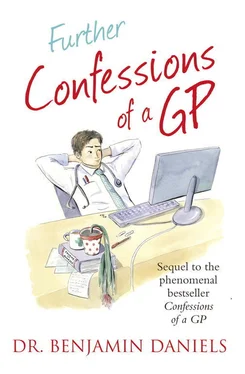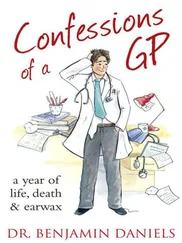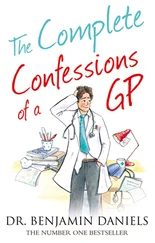As I was sorting out the last of my paperwork at the end of surgery, I decided to call the obstetric registrar at the hospital to find out what was happening.
‘Are you the GP that sent that woman in with the premature labour?’
‘Yes, that was me. How is she?’
‘Well, you didn’t quite get the diagnosis right.’
‘What do you mean?’
‘She had pseudocyesis.’
‘Oh… could you just remind me what that is?’
The obstetric registrar paused for effect and then gave a sigh. ‘It was a pretend pregnancy. As her GP we thought you might have managed to at least do a pregnancy test before getting all excited and sending the nee-naws screaming round with the flashing blue lights.’ With that the obstetric doctor put the phone down, no doubt greatly amused by his successful belittling of me.
Normally I would be irritated at such an unpleasant dressing down by some smug little upstart, but I was absolutely dumbstruck that Karen hadn’t been pregnant. Why had she lied to me? Why had she put herself through such a bizarre and ultimately humiliating experience? My patients fib to me all the time. Mostly they lie about how much they drink or try to con me into believing that their valium prescription had been stolen and they needed some more. It’s been a long time since I routinely took all my patients’ declarations to be wholly truthful, but when Karen told me she was 25 weeks pregnant, I took it completely at face value.
Shocked and upset, I turned to the internet for support and was amazed by how common and powerful false pregnancies can be. For some women the overwhelming desire to believe they are pregnant can even cause their brain to produce the release of hormones that can lead to real pregnancy symptoms such as nausea and bloating. The hormones can stop periods like a real pregnancy would, often fooling everyone around them. Admittedly, the obstetric registrar was right, a pregnancy test would have given the game away, but I have a sneaky suspicion that they only realised that Karen wasn’t really pregnant once they got out the ultrasound scanner.
As a doctor it is never nice to know that you’ve got something completely wrong, but there is an odd reassurance in knowing you are not the only one to have made that mistake. Apparently an obstetrician in the US had been fooled into taking things one step further when a woman with a false pregnancy came in to see her claiming to be nine months pregnant. When the doctor couldn’t find the baby’s heartbeat, the woman was rushed straight to surgery and given an emergency caesarean section in a desperate attempt to save the imaginary baby. It was only when they cut her open and dug around in her abdomen for a bit that they discovered there was in fact no baby to save. Makes my mistake seem relatively trivial in comparison.
I would love to have spoken to Karen again. I wasn’t angry, just confused. Did she really think that she was pregnant? Was it part of some sort of odd delusional belief that was part of a wider mental health problem? Was it just some peculiar form of attention-seeking behaviour? Sadly, I’ve never found out, because Karen never came back to see me.
I’d been called out for a home visit to see Miss Blumenthal, a 94-year-old lady who was living in one of our local nursing homes. I had never met her before, but I had visited other patients at this home and it didn’t have the best of reputations. The nurses who worked there were nice enough, but the organisation was poor and the big company who owned the home seemed to run it purely to make the maximum profit. It was always understaffed and the nurses and carers were paid a pittance. Any competent members of staff moved on quickly to better employers, leaving a few stragglers who would perhaps struggle to find any work elsewhere.
I stood ringing the doorbell for several minutes before Carmela, the nurse in charge, finally opened the front door for me. She looked very flustered.
‘Sorry, Doctor, lunchtime always very busy, busy.’
Carmela was Filipino and her English really wasn’t great.
‘So, what’s been going on then, with Miss Blumenthal?’
‘Miss Blumenthal not been eating or drinking for last few days,’ she told me, reading from a scrap of paper she’d pulled out of the pocket of her tunic.
‘Anything else you can tell me?’
Carmela studied her scrap of paper for any further information but there was clearly none. ‘I’ve been off the last few days,’ she shrugged.
‘Best go and see her then, shall we?’
Carmela led me through a network of corridors and fire doors before we reached Miss Blumenthal’s room.
‘Hello Miss Blumenthal, I’m the doctor.’
Miss Blumenthal opened her eyes briefly and mumbled something in a foreign language.
‘She used to sometimes speak to us in English, but she doesn’t any more. She only speaks to us in Polish now.’
This wasn’t unusual in people with Alzheimer’s. Even if they are completely fluent in a second language, as they slip further into dementia, they almost always lapse into speaking only their mother tongue. Carmela was wrong about the language she was mumbling in, though.
‘She’s not speaking Polish, that’s Yiddish.’
Carmela looked at me oddly: ‘But is say on her record that she is Polish.’
‘She may well have been born in Poland, but she’s Jewish and the language she is speaking is Yiddish. It’s actually closer to German than Polish.’
Carmela nodded, but looked at me suspiciously, as if I was trying to play some sort of odd trick on her. I sat on Miss Blumenthal’s bed and held her hand. She opened her eyes and I smiled at her but her look remained completely vacant. She mumbled something, again in Yiddish. Yiddish was the first language of my great-grandparents. It was once the common language of Jews all over Eastern Europe, but has now pretty much completely died out. The only words of Yiddish I know are ‘shmuck’ and ‘chutzpah’, neither of which were likely to have any great value in the current situation.
I turned my attention back to Carmela. ‘So, Miss Blumenthal doesn’t communicate much these days, but what can she do when she is well?’
Carmela again looked at me as if I was asking some sort of trick question.
‘I’ve never met Miss Blumenthal before, so I need to know how she is normally,’ I explained patiently. ‘For example, a couple of weeks ago what could she do?’
I was met with further awkward silence, so I tried to clarify things further.
‘Could she walk and eat and go to the toilet by herself?’
‘Oh no, Doctor,’ Carmela replied, relieved that she had finally got to grips with my line of questioning. ‘She used to sit in lounge, but not any more.’
‘So she’s bed bound.’
‘Yes, Doctor.’
‘And she’s incontinent of urine and faeces.’
‘Yes, Doctor.’
‘And occasionally she mumbles away in her language but doesn’t seem to understand you?’
‘Yes, Doctor.’
‘And you have to spoon-feed her puréed meals?’
‘Yes, Doctor, but last few days she is refusing to eat or drink.’
Carmela was smiling now, relieved that we seemed to have at least partly bridged what had once appeared to be an impassable chasm in our ability to communicate.
‘Does she have any family?’
‘Nobody. There is a nephew in Canada but we haven’t heard from him in years.’
Miss Blumenthal closed her eyes again and lay passively as I examined her.
As I rolled up her sleeve to check her blood pressure, I saw a series of green numbers tattooed on the inside of her left forearm. I stopped cold. It was a concentration camp tattoo. I had only seen one once before, but it was unmistakable. She opened her eyes and caught me staring dumbstruck at her forearm, but there was still not the slightest glimmer of expression in her face. In the relative peace of her nursing home, I couldn’t possibly imagine what horrors she must have witnessed 70 or so years ago in a Nazi concentration camp.
Читать дальше
Конец ознакомительного отрывка
Купить книгу











![Benjamin Franklin - Memoirs of Benjamin Franklin; Written by Himself. [Vol. 2 of 2]](/books/747975/benjamin-franklin-memoirs-of-benjamin-franklin-wr-thumb.webp)
![Benjamin Franklin - Memoirs of Benjamin Franklin; Written by Himself. [Vol. 1 of 2]](/books/748053/benjamin-franklin-memoirs-of-benjamin-franklin-wr-thumb.webp)